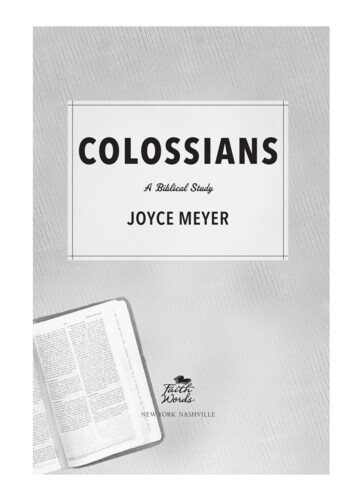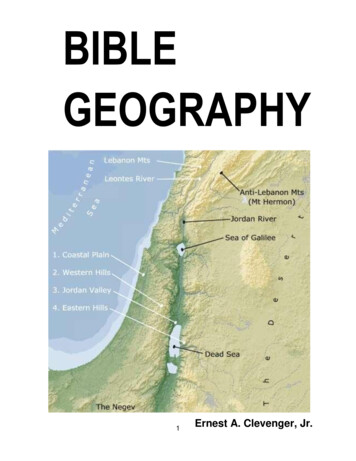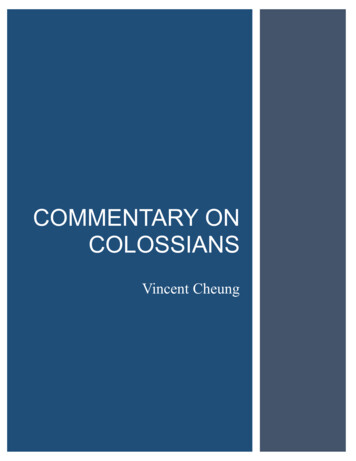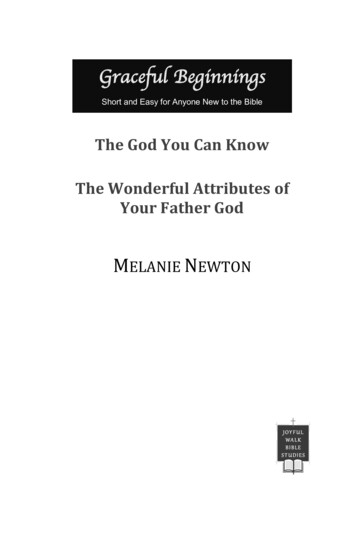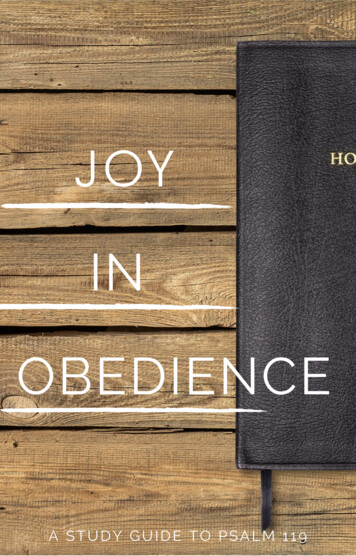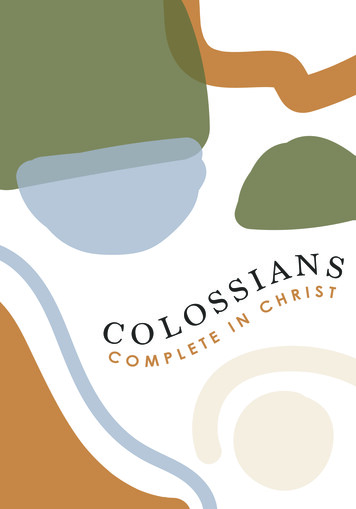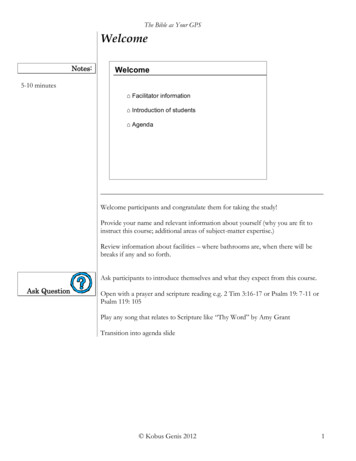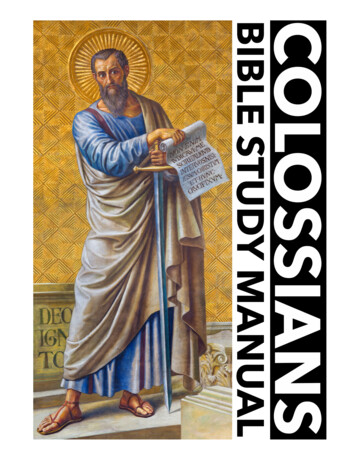
Transcription
Colossians Fall Bible Studymaterials written byMr. Nicholas Maricle,Rev. Thomas Worsham,and Dr. Justin Langford
Week 1Read: Colossians 1:1-2Text of Colossians 1:1–2Paul, an apostle of Christ Jesus by the will of God, and Timothy our brother, 2tothe holy and faithful brothers in Christ at Colosse: Grace and peace to you fromGod our Father.1Original Meaning:Before getting into these two opening verses, a few introductory words aboutColossians are necessary. This letter was written by the apostle Paul from prisonto a congregation in Asia Minor in the early 60s AD. Rome was the world powerat the time, and various religious practices were in effect throughout most ofthe Roman Empire (pantheism, emperor worship, Judaism, Christianity, andeven magic/sorcery). Christians in Paul’s day had to face these challengeshead-on as many of them made their way into the church and Christianpractice. “Syncretism” is the term for combining beliefs and practices frommore than one religious system together to form a new practice. This is whatthe Colossians were in danger of and it is why Paul composes this timely letter,to help them see their error and to present Jesus as supreme over all religioussystems.Paul’s typical pattern in ministry was to write to a congregation that hefounded on his journeys to check in on them and offer pastoral wisdom.However, we don’t believe that Paul actually began the Colossian church (itwas likely Epaphras, who is mentioned in 1:7–8; also see 2:1). As a result, ifan audience doesn’t know Paul well, he usually takes a moment to identifyhimself personally and give his credentials. We see this in the opening verse:Paul is “an apostle of Christ Jesus by the will of God.” Paul is not only an officialambassador commissioned by Jesus (see Acts 9) but he is engaging in hisministry according to God’s will, not his own. These two points are similarlymade in Galatians 1:11–12 as well: “I want you to know, brothers, that thegospel I preached is not something that man made up. I did not receive itfrom any man, nor was I taught it; rather, I received it by revelation from JesusChrist.”After establishing himself, Paul mentions his co-author and missionary partner,Timothy. He is mentioned in the opening of a number of Paul’s letters andremained a close friend and spiritual brother to Paul throughout Paul’s life. Infact, the last letters Paul writes before his death are addressed to this young
believer (1–2 Timothy). Verse 2 identifies the recipients as being in Colosse butalso that they are holy and faithful. Then, Paul gives the common greeting of“grace and peace.” Often overlooked, these two grand theological conceptsare central to the gospel message. “Grace” is God’s divine favor on sinfulhuman beings while “peace” encompasses his ideal for us which involvescompleteness, fullness, and goodness.Bridging the Context:The contemporary church struggles with many of the same issues that plaguedthe earliest churches we read about in the New Testament. Like the Colossians,we can be tempted to combine our worship of God with worship of otherthings and think it’s ok. Sometimes this goes unnoticed or unchecked. Othertimes, as in the Colossians’ case, it takes the form of giving in to the culture.Cultural beliefs and practices work their way into our churches and ourworship, then take root in our thinking, and at some point become fact for us.The problem here is that we allow these things into our minds without filteringthem through the lens of Scripture. This is destructive, and it is precisely whyPaul is writing to the Colossian church. Therefore, we should take notice of thisand seek to reflect on how this might be impacting our own worldview.Contemporary Significance:Letter openings are a wonderful reminder of the corporate work of believers.Paul is quick to give credit where it is due. Timothy was not only a valuableasset to Paul during his travels and his letter-writing, but he was often sentto various churches to carry his letters to them. The opening of Colossiansreminds us of the fact that the Christian life is meant to be lived in isolation.Moreover, terms like “grace” and “peace” are used so frequently in Christianjargon that oftentimes we don’t reflect on what they truly mean. Yes, thesewere a common greeting in early Christian circles, but that’s because graceand peace can only be found in God our Father. Through Christ we have beenbrought into a new family with God as our Father, believers as brothers andsisters, and the church as our new family.Questions for Discussion:1. What issues plague the church today? What role does our culture play incausing division in the church and how can we address this?2. How do the opening two verses of this letter prepare us for what’s comingin the rest of the letter?3. Talk about the role of God’s grace and peace in your life.
Week 2Read: Colossians 1:3-8Text of Colossians 1:3–8We always thank God, the Father of our Lord Jesus Christ, when we pray foryou, 4because we have heard of your faith in Christ Jesus and of the love youhave for all the saints—5the faith and love that spring from the hope that isstored up for you in heaven and that you have already heard about in the wordof truth, the gospel 6that has come to you. All over the world this gospel isbearing fruit and growing, just as it has been doing among you since the dayyou heard it and understood God’s grace in all its truth. 7You learned it fromEpaphras, our dear fellow servant, who is a faithful minister of Christ on ourbehalf, 8and who also told us of your love in the Spirit.3Original Meaning:In the Greek New Testament this passage is one long sentence! By grammaticalstandards today, Paul strings together one continuous run-on sentence. But adeeper look at the content of the verses shows that Paul builds on a word orconcept to make a larger point. The best way to categorize this passage is asPaul’s thanksgiving for the Colossian church and their ministry. Most biblicalscholars believe that Paul had never been to Colosse when he wrote this letter,so the fact that he’s thanking them for their vital ministry goes a long way inestablishing rapport with them before he gets into the primary content of hisletter.If you read through the text a couple times you’ll begin to notice the richtheological terms and themes Paul mentions: faith, love, hope, truth, gospel,grace, God, Lord Jesus Christ, and Spirit. Like the opening of a New Testamentletter, the thanksgiving section often introduces themes that are laterdeveloped or referenced in the letter and Colossians is no different. Wrightsays that “The paragraph gives us a valuable insight into Paul’s understandingof how God’s grace operates.”1 Verses 4–5 center on faith, love, and hope. Paulis thankful because of their faith and love, but he goes on to state that thesetwo are birthed from the hope they have. This hope is rooted in the gospelmessage which they heard and are now living out. But Paul goes further, andin verse 6 we discover that the Colossian believers are living out these threetheological virtues because they first fully understood God’s grace. If it weren’tfor his grace toward us, none of this would be true and the gospel would notbe good news.Part of the reason these believers have been steadfast and faithful is becausethey learned it from a faithful man who first proclaimed this gospel truth to
them—Epaphras (1:7–8). Paul probably didn’t begin this church, but basedon what he says here it seems that Epaphras probably did. It is because ofhis faithfulness in proclaiming the gospel that Paul now sends this letter toencourage this group of believers.Bridging the Context:The primary reason Paul writes this letter is to address false teaching that hascaused some deception and division in the Colossian church. So far in thisletter, you really can’t tell based on the content. Genuine gratitude for othersand for what God is doing goes a long way. Yes, this is Paul’s common practicein most of his letters, but we could all learn something from his approach.He doesn’t rush headlong into the main issue before he seizes the chance toencourage this struggling congregation with the foundational elements of thegospel. Moreover, he cites evidence of how they are changing the world bytheir faithful living and proclamation of the gospel. We would do well to learnfrom Paul’s example of gratitude.Contemporary Significance:In thanking the Colossians, Paul provides a basic framework of the gospelmessage and its proclamation. God’s grace is where it all begins (1:6). In aworld full of evil and sin, the gospel of Christ brings hope (1:5). As a result, ourfaith in Christ leads to loving God and others (1:4).Another point to consider from this text is the fact that the Christian life isn’t asolitary effort. Not only does Paul mention Timothy back in the opening verseof the epistle, he brings in Epaphras here to commend his faithful work inbeginning the church at Colosse. Paul says that Epaphras told them of theirfaithful work (1:8), so there’s a larger missionary team involved. The work ofadvancing the gospel is a group effort. And the encouraging point from thistext is Paul’s reminder that the gospel is spreading “all over the world” (1:6) andbearing fruit.Questions for Discussion:1. Discuss how faith and love spring forth from hope.2. How can you incorporate more gratitude into your life? Who do you needto thank for their faithfulness to you and to God?3. Spend time considering how you can share the gospel message this week.Think of specific people with whom you can share.1N. T. Wright, Colossians and Philemon (Tyndale New Testament Commentaries; Downers Grove:InterVarsity, 1986), 53.
Week 3Read: Colossians 1:9-14Text of Colossians 1:9–14For this reason, since the day we heard about you, we have not stoppedpraying for you and asking God to fill you with the knowledge of his willthrough all spiritual wisdom and understanding. 10And we pray this in orderthat you may live a life worthy of the Lord and may please him in every way:bearing fruit in every good work, growing in the knowledge of God, 11beingstrengthened with all power according to his glorious might so that you mayhave great endurance and patience, and joyfully 12giving thanks to the Father,who has qualified you to share in the inheritance of the saints in the kingdomof light. 13For he has rescued us from the dominion of darkness and broughtus into the kingdom of the Son he loves, 14in whom we have redemption, theforgiveness of sins.9Original Meaning:In this passage Paul builds on the previous text by telling why he prays forthe Colossian church and some of the content of that prayer. Central to hisprayer is the “knowledge” of God and his will: “asking God to fill you withthe knowledge of his will” and “growing in the knowledge of God” (1:9–10).Proper knowledge of God is crucial because “it is this ‘knowledge’ whichforms the basis both of holiness (v. 10) and of thanksgiving and which is thecentral characteristic of the humanity that is now renewed in Christ (3:10).”1Knowledge, in fact, is a recurring concept throughout this letter because theirknowledge of God is being assaulted with false teaching and doctrines. ButPaul isn’t referring to some abstract, ethereal knowledge that can only beattained by a select few, this knowledge is accessible to all believers “throughspiritual wisdom and understanding” (1:9) supplied by God. This rivals someof the pagan practices in their culture that suggested people could only knowthe divine realm by gaining access to secret knowledge, a line of thinking thateventually led to the practice of Gnosticism.Knowledge, however, isn’t an end in itself. It should lead to correct living. This iswhere Paul goes next. Starting in verse 10 he jumps to the practical applicationof his prayer for their knowledge: that they would live consistent with the truthof the gospel and bear fruit in accordance with it. Specifically, Paul states thatthey are to “live a life worthy of the Lord.” In verses 10–12 he lists at least fourways they can live worthily of the Lord: bearing fruit in good works, growing intheir knowledge of God, being strengthened with all power, and joyfully givingthanks to the Father.
Paul’s reflective prayer leads him to point out a major truth in the gospel story:God has rescued us from evil and brought us into his good kingdom throughJesus’ act of redemption. This perspective on life is the correct way of thinkingabout their situation. It is the core of the knowledge they need about God tonavigate the difficult situation at hand.Bridging the Context:Even though our cultures are separated by thousands of years, the churchtoday still struggles with rightly understanding God. Our knowledge of himcan oftentimes be incorrect or mixed with just enough error that it leads us andothers astray. Paul’s words in this passage offer a corrective for us when this isthe case. We must proceed with extreme caution whenever we allow “voices”(media, pastors, authors, etc.) other than Scripture to speak to and influenceus. Sometimes there is truth is what is said, but other times truth is mixed withsmall amounts of error that are difficult to detect. This was the case with theColossians, and Paul boldly steps in to offer gentle correction.Contemporary Significance:Growing in spiritual maturity begins with a correct understanding of God. Inother words, right thinking leads to right living. This is the essence of what Paulprays for the Colossian believers. Spiritual maturity is marked by a growingknowledge of God, active participation in living out the gospel, endurance,patience, and many other attributes. Knowledge shouldn’t be pursued as anend in itself, it should lead to a more robust and rich understanding of the Godwe serve and should radically change our lives as we align our thinking andliving with our Creator.Questions for Discussion:1. How can you grow in the knowledge of God? What are some practical stepsor habits you can begin in order to achieve this?2. What teachings or practices do you see in Christian culture today that mightnot align with Scripture? How can we go about addressing these issues?3. Spend time in prayer thanking God for delivering you from “the dominionof darkness.” Discuss how the redemption we have through Jesus shouldchange our perspective on our circumstances.1Wright, 61.
Week 4Read: Colossians 1:9-14Text of Colossians 1:9–14For this reason, since the day we heard about you, we have not stoppedpraying for you and asking God to fill you with the knowledge of his willthrough all spiritual wisdom and understanding. 10And we pray this in orderthat you may live a life worthy of the Lord and may please him in every way:bearing fruit in every good work, growing in the knowledge of God, 11beingstrengthened with all power according to his glorious might so that you mayhave great endurance and patience, and joyfully 12giving thanks to the Father,who has qualified you to share in the inheritance of the saints in the kingdomof light. 13For he has rescued us from the dominion of darkness and broughtus into the kingdom of the Son he loves, 14in whom we have redemption, theforgiveness of sins.9Original Meaning:In this passage Paul builds on the previous text by telling why he prays forthe Colossian church and some of the content of that prayer. Central to hisprayer is the “knowledge” of God and his will: “asking God to fill you withthe knowledge of his will” and “growing in the knowledge of God” (1:9–10).Proper knowledge of God is crucial because “it is this ‘knowledge’ whichforms the basis both of holiness (v. 10) and of thanksgiving and which is thecentral characteristic of the humanity that is now renewed in Christ (3:10).”1Knowledge, in fact, is a recurring concept throughout this letter because theirknowledge of God is being assaulted with false teaching and doctrines. ButPaul isn’t referring to some abstract, ethereal knowledge that can only beattained by a select few, this knowledge is accessible to all believers “throughspiritual wisdom and understanding” (1:9) supplied by God. This rivals someof the pagan practices in their culture that suggested people could only knowthe divine realm by gaining access to secret knowledge, a line of thinking thateventually led to the practice of Gnosticism.Knowledge, however, isn’t an end in itself. It should lead to correct living. This iswhere Paul goes next. Starting in verse 10 he jumps to the practical applicationof his prayer for their knowledge: that they would live consistent with the truthof the gospel and bear fruit in accordance with it. Specifically, Paul states thatthey are to “live a life worthy of the Lord.” In verses 10–12 he lists at least fourways they can live worthily of the Lord: bearing fruit in good works, growing intheir knowledge of God, being strengthened with all power, and joyfully givingthanks to the Father.
Paul’s reflective prayer leads him to point out a major truth in the gospel story:God has rescued us from evil and brought us into his good kingdom throughJesus’ act of redemption. This perspective on life is the correct way of thinkingabout their situation. It is the core of the knowledge they need about God tonavigate the difficult situation at hand.Bridging the Context:Even though our cultures are separated by thousands of years, the churchtoday still struggles with rightly understanding God. Our knowledge of himcan oftentimes be incorrect or mixed with just enough error that it leads us andothers astray. Paul’s words in this passage offer a corrective for us when this isthe case. We must proceed with extreme caution whenever we allow “voices”(media, pastors, authors, etc.) other than Scripture to speak to and influenceus. Sometimes there is truth is what is said, but other times truth is mixed withsmall amounts of error that are difficult to detect. This was the case with theColossians, and Paul boldly steps in to offer gentle correction.Contemporary Significance:Growing in spiritual maturity begins with a correct understanding of God. Inother words, right thinking leads to right living. This is the essence of what Paulprays for the Colossian believers. Spiritual maturity is marked by a growingknowledge of God, active participation in living out the gospel, endurance,patience, and many other attributes. Knowledge shouldn’t be pursued as anend in itself, it should lead to a more robust and rich understanding of the Godwe serve and should radically change our lives as we align our thinking andliving with our Creator.Questions for Discussion:1. How can you grow in the knowledge of God? What are some practical stepsor habits you can begin in order to achieve this?2. What teachings or practices do you see in Christian culture today that mightnot align with Scripture? How can we go about addressing these issues?3. Spend time in prayer thanking God for delivering you from “the dominionof darkness.” Discuss how the redemption we have through Jesus shouldchange our perspective on our circumstances.1Wright, 61.
Week 5Read: Colossians 1:15–20Text of Colossians 1:15–20He is the image of the invisible God, the firstborn over all creation. 16Forby him all things were created: things in heaven and on earth, visible andinvisible, whether thrones or powers or rulers or authorities; all things werecreated by him and for him. 17He is before all things, and in him all things holdtogether. 18And he is the head of the body, the church; he is the beginning andthe firstborn from among the dead, so that in everything he might have thesupremacy. 19For God was pleased to have all his fullness dwell in him, 20andthrough him to reconcile to himself all things, whether things on earth or thingsin heaven, by making peace through his blood, shed on the cross.15Original Meaning:This passage has the distinction of being one of the loftiest theological textsin the New Testament. Here, Paul outlines fundamental truths about Jesus andwhy he is not one god among many (as some may have thought in Paul’s day)but supreme over all. It is important to note that in light of the false teachingPaul is addressing in this letter, he doesn’t begin by detailing all the bad ideasor false presentations to be on guard against. Instead, he begins by presentingJesus as the authentic standard against whom we compare everything oreveryone else.Simply put, Paul provides at least eight foundational theological truths thatgive evidence to Jesus’ supremacy. First, he is God. He is “the image of theinvisible God.” In Jesus we can fully know, see, and experience God. Second,his existed before creation. When Paul says that Jesus was the “firstborn overcreation” he uses this term to indicate not that Jesus was the first of all createdbeings (which would falsely imply Jesus hasn’t always existed and that he wascreated) but to indicate rank. That is, Jesus resides as ruler over all the createdorder. Third, Jesus was involved in the act of creation (“through him all thingswere created”). Fourth, in him all creation has its proper place (“in him all thingshold together”). So Jesus not only was involved in creation but he continuallysustains all things. Fifth, all creation was made for him and to glorify him. Sixth,through the reconciliation he has accomplished we are now a new creationin him. Seventh, he has the unique role (because of who he is and what he’sdone) of being the head of the church, setting the faithful example of service,humility, and sacrifice. And eighth, because of his resurrection he is the first inthe family of God to rise in power and mark the path of all successive believers.
Bridging the Context:While many in Paul’s day and in the Colossian church had different conceptionsof Jesus and of his place among the pantheon of pagan gods, Paul sets therecord straight here with a definitive and convincing list of reasons why Jesusis superior and sovereign. But as much as this text is about Jesus—and rightlyso!—it is also about us and our role in this world. N. T. Wright comments that“Colossians 1:15–20 gives the church not merely an exalted view of Jesus, andhence of humanity, but of God and his world.”1 This passage helps us also seeour role in this beautiful world God has created: agents of reconciliation. If allthings have been made by and for Jesus, then as members of God’s familyour mission is to point everyone to him as the proper object of their lives andworship.Contemporary Significance:This text is singularly focused on why Christ should receive all the glory, whyhe is worthy of our lives, our thoughts, our time, and our worship. If we arecreated by him and for him, then we should live our lives to bring him glory(not ourselves). In this passage Paul also demonstrates that God is in thebusiness of reconciliation. If we believe him and claim to know and follow him,then we also must be people of reconciliation. As we reflect on the supremacyof Jesus over all people and all creation, it should put the purpose of our livesin sharp focus. We were created to know him, love him, and love others. As newcreations in Christ, we have a part to play in bringing about reconciliation. Indoing so we continually are moving toward the perfect and complete ideal thatcharacterized God’s relationship with humankind before sin entered the world.Questions for Discussion:1. If Jesus truly is supreme over all, then why do we so quickly seek our ownglory and fame? How can we go about eliminating selfishness and pride inour hearts?2. How does this passage clarify your purpose on this earth? In what ways canyou glorify God in your chosen vocation?3. Paul lists a number of reasons why Jesus is supreme over all. Is thereanything else you would add to his list? If so, why?1Wright, 84.
Week 6Read: Colossians 1:21-23Text of Colossians 1: 21-23Once you were alienated from God and were enemies in your minds becauseof your evil behavior. 22 But now he has reconciled you by Christ’s physical bodythrough death to present you holy in his sight, without blemish and free fromaccusation— 23 if you continue in your faith, established and firm, and do notmove from the hope held out in the gospel. This is the gospel that you heardand that has been proclaimed to every creature under heaven, and of which I,Paul, have become a servant.21Original Meaning:Having discussed the human condition on the large scale in the previousverses, Paul now makes his point personal: The Colossians were enemies ofGod by nature. Making matters worse, Paul won’t even hear of the Colossiansblaming someone else or fate for their actions. They were not mere victims oftheir circumstances, nor were they tricked into sinning. Much to the contrary,Paul says that the Colossians’ minds were evil and turned against God. Sincetheir minds were evil, they willingly engaged in evil actions. In short, theColossians were enemies of God from start to finish, and no one was to blamebut themselves.Fortunately, Paul says that they are no longer God’s enemies because Godhas acted. At this point, Paul reminds the Colossians that salvation is totally anact of God. The Colossians could not save themselves because they were evilfrom start to finish. What saved them was not their own good works. Instead,what saved them was the work of Christ. Through what he did in the Gospelsand on the cross, he performed two works: he put sin away from believers andgave believers his righteousness. Based on Christ alone, the Colossians wererighteous in the eyes of God.The Colossians weren’t entirely passive, however. In the final verse, Paul saysthat the benefits of Christ are theirs if they continue in the faith and cling to thegospel. The gospel message says that all humans are sinful, that Christ died forall people, and that anyone can be saved by calling on Christ’s name. Paul toldthe Colossians that if they clung to this message, they would surely be saved.
Bridging the Context:We live in a very different world from the Colossians, but we’re like them inimportant ways. First, like the Colossians, all of us are sinners. Of all Christiandoctrines, our view of the nature of human beings should be accepted byeveryone. When we’re honest with ourselves, all of us know that we makemistakes, both intentionally and unintentionally. As he said to the Colossians,Paul would tell us that our moral failures are not small or insignificant. Instead,moral failures are sins against God that make us his enemies. We, like theColossians, are sinful from start to finish. We repeatedly choose to sin againstGod, and we alone are to blame.Second, Jesus can save us like he saved the Colossians. Fortunately, Jesusdoesn’t tell us to save ourselves or to prepare ourselves before calling on him.Instead, salvation is entirely God’s work. God takes us as we are, blemishesand failures and all. We also receive the same benefits as the Colossians. Jesusdoesn’t just forgive us for our sins; Jesus credits righteousness to us such that,if we call on him, we are without accusation before God. Luther called this alienrighteousness, and it’s a wonderful idea.Like the Colossians, we aren’t entirely passive. Instead, God calls us to clingto the gospel message for the rest of our lives. We aren’t called to chase whatfeels right or whatever is popular. Instead, these verses teach us to plant ourflag at the base of the cross of Christ and cling to the gospel no matter whatmay come. Here only will we find the solution to the problem of our ownsinfulness.Contemporary Significance:1. Sin is the ultimate problem of human existence.2. Jesus can save all people, no matter what they’ve done.3. Those who are saved cling to the gospel.Questions for Discussion:1. Paul short circuits any attempt the Colossians might make to blame theirsinfulness on their circumstances. Do you ever blame others for your ownmistakes? How does accepting responsibility for your sins help you see thegrace of Christ more clearly?2. Paul teaches that we cannot save ourselves. What impact does this teachinghave on your life? Does this worry you or cause you to feel a sense of relief?Which is more appropriate and why?3. Paul stresses the need to cling to the gospel. What are some practical waysyou can cling to the gospel message?
Week 7Read: Colossians 1:24-29Text of Colossians 1:24-29Now I rejoice in what I am suffering for you, and I fill up in my flesh what isstill lacking in regard to Christ’s afflictions, for the sake of his body, which isthe church. 25 I have become its servant by the commission God gave me topresent to you the word of God in its fullness— 26 the mystery that has been kepthidden for ages and generations, but is now disclosed to the Lord’s people.27To them God has chosen to make known among the Gentiles the gloriousriches of this mystery, which is Christ in you, the hope of glory. 28 He is the onewe proclaim, admonishing and teaching everyone with all wisdom, so that wemay present everyone fully mature in Christ. 29 To this end I strenuously contendwith all the energy Christ so powerfully works in me.24Original Meaning:Paul wrote the book of Colossians in chains. As he discussed in 2 Corinthians11, Paul faced a lot of persecution and opposition during his ministry. Whilewriting Colossians, Paul was experiencing persecution that led to his arrest.And yet, Paul was not upset, nor did he complain about his setting. Much tothe contrary, Paul says that he rejoiced in his suffering. For Paul, to suffer in theChristian life is to be joined to Christ and to participate in Christ’s redemptivesuffering.Paul tells us exactly why he was suffering: He was suffering for the riches of thegospel. Two facets of Paul’s description of the gospel demand consideration.First, Paul says that the gospel is “the word of God in its fullness.” Christ is theculmination of God’s message to human beings. The Old Testament looksforward to Christ, the Gospels describe Christ, and the New Tes
standards today, Paul strings together one continuous run-on sentence. But a deeper look at the content of the verses shows that Paul builds on a word or concept to make a larger point. The best way to categorize this passage is as Paul’s thanksgiving f
